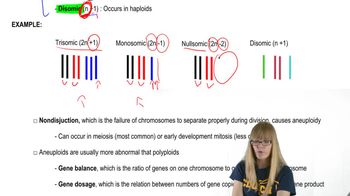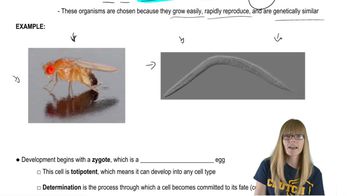Here are the essential concepts you must grasp in order to answer the question correctly.
Aneuploidy
Aneuploidy refers to the presence of an abnormal number of chromosomes in a cell, which can result from nondisjunction during meiosis. This condition can lead to various genetic disorders, depending on which chromosomes are affected. In humans, aneuploidy is most commonly associated with conditions like Down syndrome, which is caused by an extra copy of chromosome 21.
Recommended video:
Chromosomal Mutations
Chromosomal mutations involve changes in the structure or number of chromosomes, which can occur through mechanisms such as deletion, duplication, inversion, or translocation. These mutations can significantly impact gene expression and lead to developmental abnormalities. Understanding these mutations is crucial for studying genetic disorders and their inheritance patterns.
Recommended video:
Embryonic Development and Survival
Most aneuploid embryos do not survive to term due to the severe developmental challenges posed by chromosomal imbalances. However, early detection methods, such as preimplantation genetic diagnosis and prenatal screening, have shown that aneuploidy can be present at conception. This highlights the importance of understanding the early stages of embryonic development and the factors that influence survival rates of embryos with chromosomal abnormalities.
Recommended video:
 Verified step by step guidance
Verified step by step guidance Verified video answer for a similar problem:
Verified video answer for a similar problem:

